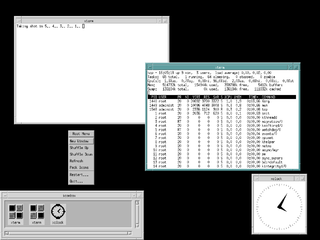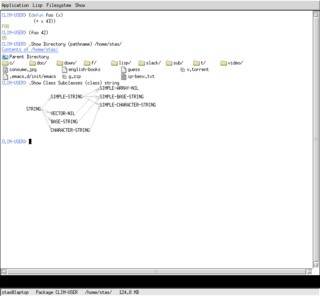
Common Lisp (CL) is a dialect of the Lisp programming language, published in American National Standards Institute (ANSI) standard document ANSI INCITS 226-1994 (S2018). The Common Lisp HyperSpec, a hyperlinked HTML version, has been derived from the ANSI Common Lisp standard.

Lisp is a family of programming languages with a long history and a distinctive, fully parenthesized prefix notation. Originally specified in the late 1950s, it is the second-oldest high-level programming language still in common use, after Fortran. Lisp has changed since its early days, and many dialects have existed over its history. Today, the best-known general-purpose Lisp dialects are Common Lisp, Scheme, Racket, and Clojure.
Symbolics, Inc., was a privately held American computer manufacturer that acquired the assets of the former company and continues to sell and maintain the Open Genera Lisp system and the Macsyma computer algebra system.

Genera is a commercial operating system and integrated development environment for Lisp machines created by Symbolics. It is essentially a fork of an earlier operating system originating on the Massachusetts Institute of Technology (MIT) AI Lab's Lisp machines which Symbolics had used in common with Lisp Machines, Inc. (LMI), and Texas Instruments (TI). Genera was also sold by Symbolics as Open Genera, which runs Genera on computers based on a Digital Equipment Corporation (DEC) Alpha processor using Tru64 UNIX. In 2021 a new version was released as Portable Genera which runs on Tru64 UNIX on Alpha, Linux on x86-64 and Arm64 Linux, and macOS on x86-64 and Arm64. It is released and licensed as proprietary software.

Maxima is a powerful software package for performing computer algebra calculations in mathematics and the physical sciences. It is written in Common Lisp and runs on all POSIX platforms such as macOS, Unix, BSD, and Linux, as well as under Microsoft Windows and Android. It is free software released under the terms of the GNU General Public License (GPL).

In computing, Motif refers to both a graphical user interface (GUI) specification and the widget toolkit for building applications that follow that specification under the X Window System on Unix and Unix-like operating systems. The Motif look and feel is distinguished by its use of rudimentary square and chiseled three-dimensional effects for its various user interface elements.
An object-oriented operating system is an operating system that is designed, structured, and operated using object-oriented programming principles.

CLISP is an implementation of the programming language Common Lisp originally developed by Bruno Haible and Michael Stoll for the Atari ST. Today it supports the Unix and Microsoft Windows operating systems.
CMUCL is a free Common Lisp implementation, originally developed at Carnegie Mellon University.
A read–eval–print loop (REPL), also termed an interactive toplevel or language shell, is a simple interactive computer programming environment that takes single user inputs, executes them, and returns the result to the user; a program written in a REPL environment is executed piecewise. The term usually refers to programming interfaces similar to the classic Lisp machine interactive environment. Common examples include command-line shells and similar environments for programming languages, and the technique is very characteristic of scripting languages.
In computing, minimalism refers to the application of minimalist philosophies and principles in the design and use of hardware and software. Minimalism, in this sense, means designing systems that use the least hardware and software resources possible.

Steel Bank Common Lisp (SBCL) is a free Common Lisp implementation that features a high-performance native compiler, Unicode support and threading. It is open source software, with a permissive license. In addition to the compiler and runtime system for ANSI Common Lisp, it provides an interactive environment including a debugger, a statistical profiler, a code coverage tool, and many other extensions.

StumpWM is a tiling window manager that was created when developer Shawn Betts found ratpoison growing increasingly large and "lispy". Intended as a successor to ratpoison, StumpWM is released under the terms of the GPL-2.0-or-later license.
A foreign function interface (FFI) is a mechanism by which a program written in one programming language can call routines or make use of services written or compiled in another one. An FFI is often used in contexts where calls are made into binary dynamic-link library.
Dylan programming language history first introduces the history with a continuous text. The second section gives a timeline overview of the history and present several milestones and watersheds. The third section presents quotations related to the history of the Dylan programming language.

The Common Lisp Interface Manager (CLIM) is a Common Lisp-based programming interface for creating user interfaces, i.e., graphical user interfaces (GUIs). It provides an application programming interface (API) to user interface facilities for the programming language Lisp. It is a fully object-oriented programming user interface management system, using the Common Lisp Object System (CLOS) and is based on the mechanism of stream input and output. There are also facilities for output device independence. It is descended from the GUI system Dynamic Windows of Symbolics' Lisp machines between 1988 and 1993.
... you can check out Common Lisp Interface Manager (CLIM). A descendant of the Symbolics Lisp machines GUI framework, CLIM is powerful but complex. Although many commercial Common Lisp implementations actually support it, it doesn't seem to have seen a lot of use. But in the past couple years, an open-source implementation of CLIM, McCLIM – now hosted at Common-Lisp.net – has been picking up steam lately, so we may be on the verge of a CLIM renaissance. – From Practical Common Lisp
Apple Dylan is the original implementation of the programming language Dylan. It was developed by Apple Computer from 1992 to 1995.
Clozure CL (CCL) is a Common Lisp implementation. It implements the full ANSI Common Lisp standard with several extensions. It contains a command line development environment, an experimental integrated development environment (IDE) for Mac OS X using the Hemlock editor, and can also be used with SLIME. Clozure CL is open source and the project is hosted by Clozure Associates.
Macintosh Common Lisp (MCL) is an implementation and IDE for the Common Lisp programming language. Various versions of MCL run under the classic Mac OS and Mac OS X.

OpenLisp is a programming language in the Lisp family developed by Christian Jullien from Eligis. It conforms to the international standard for ISLISP published jointly by the International Organization for Standardization (ISO) and International Electrotechnical Commission (IEC), ISO/IEC 13816:1997(E), revised to ISO/IEC 13816:2007(E).








